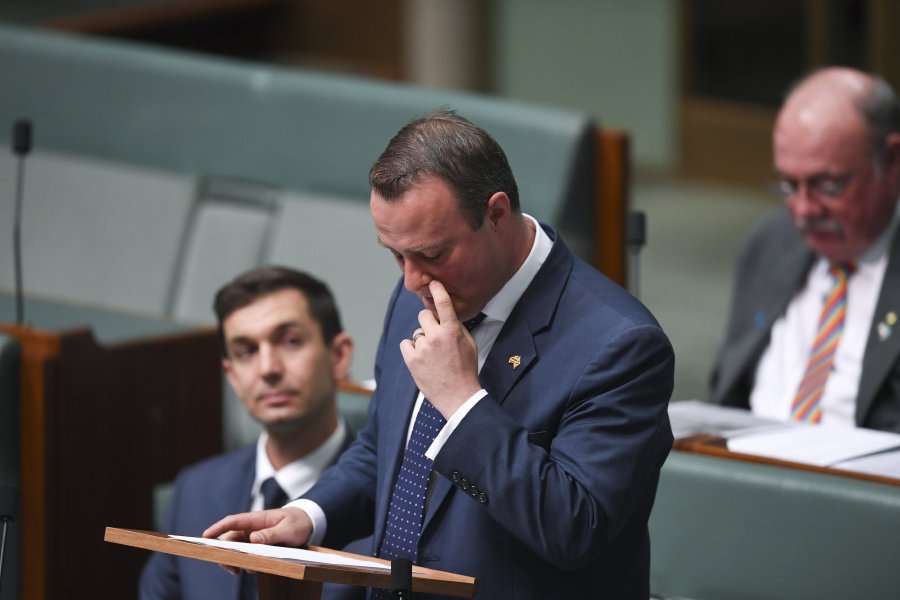Source:
https://www.nst.com.my/world/2017/12/310546/australia-mp-proposes-gay-partner-parliament
Australia MP proposes to gay partner in parliament

Liberal MP Tim Wilson reacts after proposing to his partner Ryan Bolger during debate of the Marriage Amendment bill in the House of Representatives at Parliament House in Canberra, Dec 4, 2017. AAP/Lukas Coch via Reuters Photo
SYDNEY: A gay Australian lawmaker popped the question in parliament on Monday, proposing to his partner moments after a bill paving the way for same-sex marriage was introduced.
Tim Wilson, who has reportedly been engaged to Ryan Bolger for nine years, fought back tears as he thanked his fiance for enduring a marriage debate that “has been the soundtrack to our relationship.”
“In my first speech I defined our bond by the ring that sits on both of our left hands – that they are the answer to the questions we cannot ask,” the 37-year-old lawmaker from the ruling conservative party said.
“So there is only one thing left to do: Ryan Patrick Bolger will you marry me?”
Bolger, who was sitting in the public gallery, quickly responded “yes” as the floor erupted in applause.
“That was a ‘yes’, a resounding ‘yes’,” house speaker Rob Mitchell noted for the record. “Congratulations, well done mate.”
Wilson earlier emotionally recalled the uneasiness he experienced with some friends when he and Bolger were first engaged.
“Many simply didn’t know how to react. Many SMS went unresponded. In conversations some people politely changed the topic, or fell silent entirely,” he said.
His partner had pushed him to have an engagement party.
“On informing one person of our news, they responded: Why bother?
“At the time I fell silent and I have never had an answer to that question. But the Australian people have now answered that for me.”
The same-sex marriage bill being debated is expected to comfortably pass through the House of Representatives before Christmas after the upper house Senate last week overwhelmingly voted in its favour.
After more than a decade of debate, Australians emphatically endorsed gay marriage in a recent nationwide postal vote, with some 62 percent of the 12.7 million who took part voting “yes” last month.
“This is a historic moment of inclusion, of recognition, of respect,” Prime Minister Malcolm Turnbull said shortly after the bill was introduced for debate in the lower house Monday.
“This is a day to be especially proud that all of our friends, our colleagues, our neighbours, our brothers, our sisters, can marry the people they love.”
Former conservative prime minister Tony Abbott, a leading voice in the ‘no’ campaign, said he would now back the bill.
“I certainly don’t pretend to be an overnight convert to support same-sex marriage but I am pledged to respect and to facilitate the verdict of the Australian people,” he said.
“Same-sex marriage should now be recognised. It will now be recognised.”
Abbott moved an amendment he said protected discrimination against anyone over their “conscientious view about the nature of marriage“, before saying he planned to attend his gay sister’s wedding next year.
“I am looking forward to attending the marriage of my sister, Christine, to her partner Virginia some time early in the new year.” -- AFP
-------------------------------------------------------------------------------------------------
Comments:
ALL major RELIGIONS condemned and prohibited same sex marriage ! For examples, Islam, Christian, Hinduism, Judaism, prohibited same sex marriage.
Most LAWS of the world also prohibited same sex marriage!
The parliament should not allowed such things to happen, or even discuss such thing as same sex marriage. BIG shame against all norms, religions, and laws of the world !
.